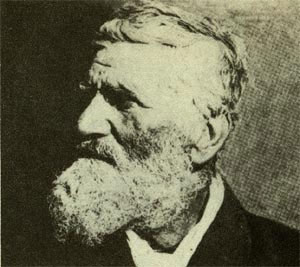.
Yiorgos (or George) Caralambo (? - September 2, 1913) was a camel driver hired by US Army in 1856 for the Camel Corps experiment in the Southwest. The camels were to be tested for use in transportation across the "Great American Desert."[1]

Yiorgos Caralambo
Caralambo, who was of Greek ancestry, was living in Smyrna, Turkey, when he was selected for the Camel Corps. The American government hired eight camel drivers from Asia Minor to tend for the animals.[2] Caralambo and the other camel drivers arrived at the Port of Indianola in Lavaca County, Texas with their animals on the USS Supply.[3] In Steven Dean Pastis' article "Go West Greek George," the eight men are identified: Caralambo, Hadji Ali (later known as Philip Tedro), Mimico Teodora (Mico), Hadjiatis Yannaco (Long Tom), Anastasio Coralli (Short Tom), Michelo Georgios, Yanni IIIato and Giorgios Costi.
The United States had purchased a total of 33 camels: 3 in Tunis, 9 in Egypt, and 21 in Smyrna. The Camel Corps hauled supplies to build the Butterfield Overland Stage Route from St. Louis, Missouri to Los Angeles. The route was completed by September 1858.
Through his service in the Camel Corps, Greek George met Major Henry Hancock, a Harvard trained lawyer and wealthy Los Angeles landowner. Hancock was so impressed by Caralambo's dedication that he wanted to employ him privately to drive camels carrying mail along the Butterfield Route. Hancock allowed Greek George to build a farmhouse with stables to house the dromedaries in the northwest part of Rancho La Brea, in present-day West Hollywood. The plan fell through when the Army disbanded the Camel Corps in 1862. Greek George was forced to turn the camels into the wild; they roamed the area for at least thirty years afterwards.
Greek George remained at Rancho La Brea well into the 1870s, taking care of Major Hancock's cattle and horses. He became a naturalized United States citizen in 1867 and changed his name to George Allen.
On May 5, 1874, Tiburcio Vasquez, the most notorious of the Mexican banditos to terrorize California in the 1870s and 1880s, was captured while hiding out in a shack behind the home of Caralambos, known to locals as "Greek George". Vasquez, who terrorized Southern California for over twenty-three years, frequently used Greek George's farmhouse as one of his numerous hideouts. Someone informed on Vasquez, possibly Greek George himself, enticed by the $15,000 reward. However, others claim it was a relative of Vasquez, angry because the outlaw had had an affair with the relative's niece. A posse led by Sheriff Albert Johnson rode from Los Angeles to Greek George's residence. The site is in present day West Hollywood, thought to be near the corner of Santa Monica Boulevard and King's Road.
Caralambos later moved to Montebello, California and died near Mission Vieja San Gabriel in 1913.
Notes
^ Cache:fFl3fT-NI64J:www.cr.nps.gov/history/online_books/region_111/vol2-3f.htm Greek George Hadji Ali - Google Search at 72.14.207.104
^ Fall 2004 at 72.14.207.104
^ FTHA History - Camels at 72.14.203.104
| Ancient Greece
Science, Technology , Medicine , Warfare, , Biographies , Life , Cities/Places/Maps , Arts , Literature , Philosophy ,Olympics, Mythology , History , Images Medieval Greece / Byzantine Empire Science, Technology, Arts, , Warfare , Literature, Biographies, Icons, History Modern Greece Cities, Islands, Regions, Fauna/Flora ,Biographies , History , Warfare, Science/Technology, Literature, Music , Arts , Film/Actors , Sport , Fashion --- |
Retrieved from "http://en.wikipedia.org/"
All text is available under the terms of the GNU Free Documentation License

